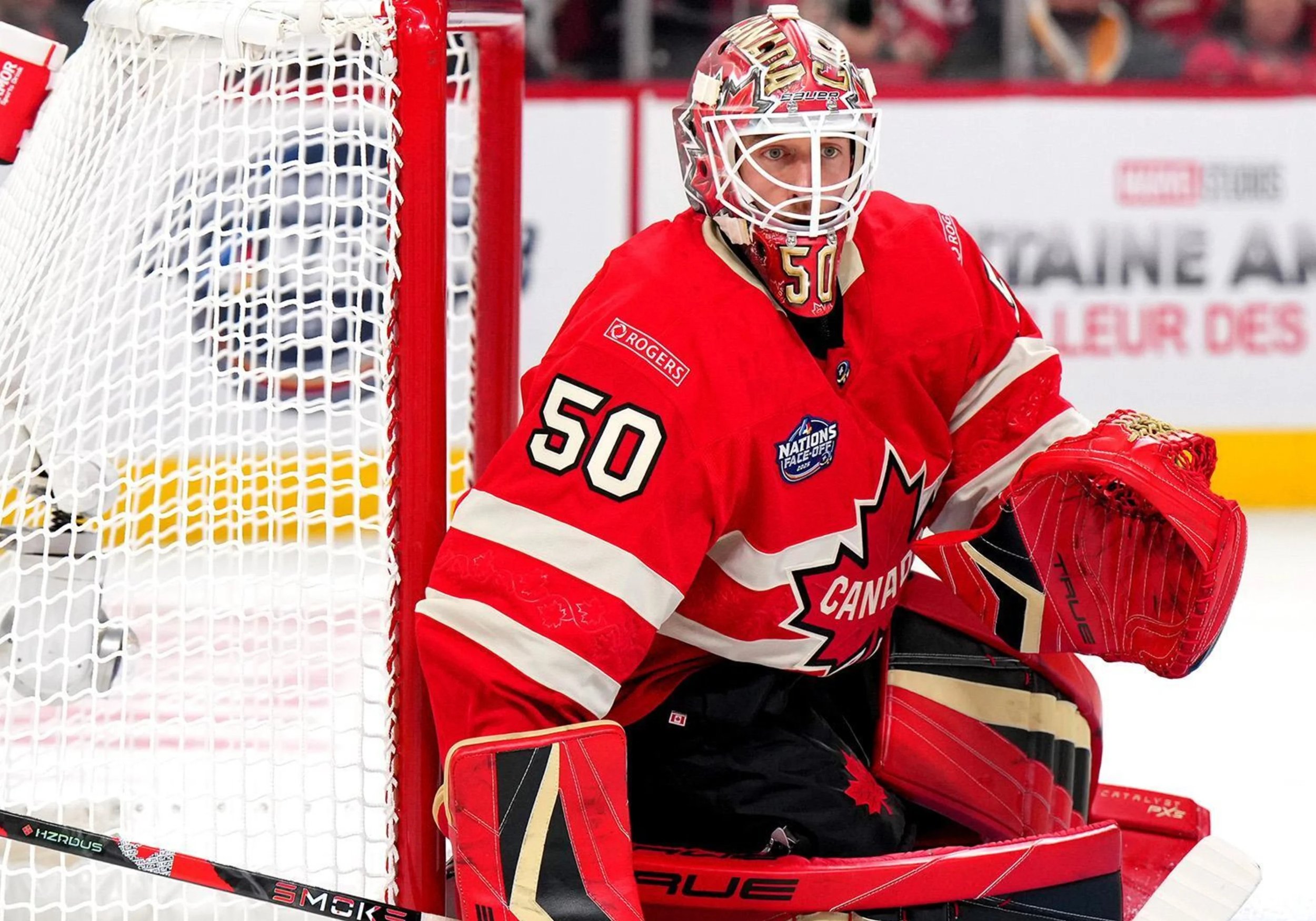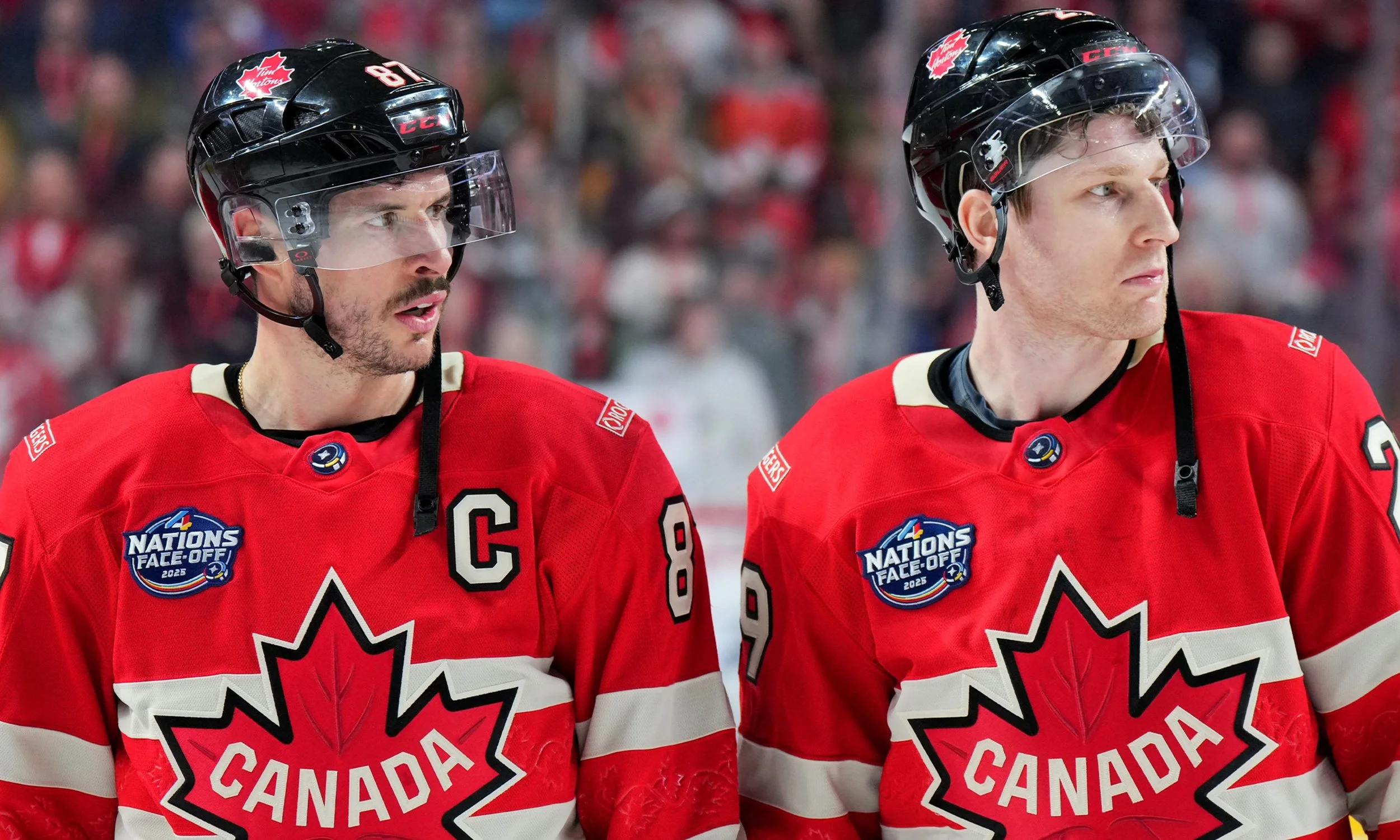November 17, 2025 | 3:20pm ET
By Mike Cranwell, TheFourthPeriod.com
CANADA’S OLYMPIC ROSTER HAS PLENTY OF OPTIONS
Getty Images
Sidney Crosby and Nathan MacKinnon
As we are closing in on having completed Q1 of the 2025-26 NHL season and are six weeks away from when rosters are due, it’s time to put on my Architect hat and have some fun.
Today, we’re going to look at my early projections for Team Canada’s Olympic roster.
We’ll break this into two sections: an all-points-based team, and the actual team.
My rule for creating these points-based rosters: the top-12 forward and top-six defensemen are all based on most points; the alternates based on highest PPG of the remaining players (min. 10 games played).
Of course, the Olympic teams will not be chosen purely on point production. At the same time, it’s a worthwhile exercise to examine players from this prospective to see who is producing this year…right now, as we head into the Olympics. We’ll start with Team Canada, because it’s currently snowing where I live.
Team Canada (points-based)
Just missed the graphic
Forward: Morgan Geekie, Quinton Byfield, Tom Wilson, Ryan Nugent-Hopkins
Defense: Vince Dunn, Noah Dobson
Goaltender: Jet Greaves
Some interesting borderline names here. John Tavares, who is starting to become an ageless wonder, has been the steadying force on a decidedly unsteady Maple Leafs team this year, and (losing a PPG tiebreaker) is sixth in scoring for all Canadian players with 24 points in 19 games. He can be trusted in all situations and has a recent history of clutch goals.
Bo Horvat is playing like it was a contract year, or at least it feels like it as he has 12 goals and 23 points in 18 games, and is playing nearly 21 minutes a game in all situations. He’s one of two main reasons the Islanders are currently a playoff team. The buzz around him is for good reason.
With 11 goals and 21 points in 19 games, Wyatt Johnson is announcing himself to Team Canada brass. (Aside: Why are people in leadership referred to as “brass”, where did this come from?) His defensive game leaves a little to be desired, though his RelCF% (basically how many shots on goal Dallas gets with him on the ice vs when he’s not is above the team’s average, which speaks to how he’s driving play.
On defense, for me there’s a lot of surprise here in a way, though it does illustrate that the Four Nations roster – and likely this upcoming Olympics roster – will not be focusing solely on point producers. If they were, someone like Morgan Rielly, who has zero Olympic buzz, would be getting talked about regularly. He drove the net to score last night, his third goal of the season. Rielly’s 15 points in 18 games are tied for fourth among Canadian defensemen, and with 13 of those points coming at even-strength, he has shown to be someone who can drive 5v5 play. Defensively, well, he is what he is, though I’d have him a level ahead of this next player…
Thank goodness he is putting up points, because watching Evan Bouchard play in his own zone this season has been like watching someone get lost in a house of mirrors. Nothing has changed from when he was with the London Knights, or over-ripening with AHL Bakersfield (and likely Sodertalje as well). He’s great offensively, strong passer, cannon of a point shot (does anyone remember Jeff Brown? It’s reminiscent), but damn, sometimes in his own zone, he is Sarah McLachlan and he’s Building a Mystery. Too on-the-nose Canadian? Too ADHD? You’re a bigger fan of the ironically-titled Silence? Me too, so let’s keep going.
My goodness, while I will forever stick by the idea of letting 18-year-old defensemen develop in Junior, especially when he misses most of his draft year, and double especially someone with the recently life happenings that he’s had, Matthew Schaefer is so, so very impressive.
As with Rielly, Schaefer has 15 points in 18 games. The difference? More goals, better defensively (though he still has the moments you’d expect of an 18-year-old where he tries to make a play on a puck carrier and gets beat. He’ll learn, they all do), and playing nearly 23 minutes a night – as an 18-year-old defensemen! He’s had more games where he’s played 25-27 minutes a game (six) than 17 minutes (four, including opening night which should be expected). These are not empty-calorie points, he’s impacting the game in all three zones and in the room, where he seems to be loved by all. Patrick Roy has developed a reputation for his ability to develop young talent, and if Schaefer was going to stay in the bigs this year, it’s a good thing that he has Roy there to guide him. You watch this kid play, and if we’re talking purely hockey play, he’s on this team, full stop.
Jake Walman is far better than advertised, and some of the discussion when he signed his recent contract only outed some podcasters on how little they know about him.
You show’em Jordan Spence, keep going!
In goal, Jake Allen and Scott Wedgewood are career backups who have had to step up and play starter minutes while each team’s respective starting goalie has been out with injury. Both have done so admirably. They will not make Team Canada; however, they deserve their flowers for keeping their teams well above water for nearly a quarter of the season.
Now then, brass tacks (again, from where did this come to us?), let’s build. This roster will have two extra forwards and one extra D, to account for prospective injuries.
Please understand that these are my projections from my perspective. It’s very easy to look at the Four Nations team that won, who’s running this team, and simply put all the same players out regardless of how these players are playing this year. However, this is the Olympics; this is the Stanley Cup in a bottle. You have to be analytical, not driven by heart.
There are two major omissions: Brayden Point and Sam Bennett.
Regardless of his rings or the fact that his Head Coach, Jon Cooper, is leading Team Canada. Point is not driving play, he’s not getting the ice time (from Cooper, two less 5v5 shifts per game taking him down to second-line ice time), and frankly, he wasn’t anything special at Four Nations. There are seven new forwards on this roster who all could produce that or more at these Olympics.
Contrast that to Brandon Hagel, who also is getting less ice time this year yet is crushing his minutes to the point where I am confused as to why Hagel’s not playing more, hence why Hagel is here. I can’t put him ahead of those above him who are producing, and he was solid if unspectacular at the Four Nations (one assist, -2 in four games). He deserves real consideration.
In the case of Bennett, as I’m combing through players to ensure I didn’t forget anyone (Zach Hyman, my fingers are crossed), he was 100% out of sight, out of mind. Three goals and two assists is a good night for Bedard and Celebrini this year. That’s Bennett’s entire season through 18 games. He’s playing just over 16 minutes per game, yes, his analytics are all positive, and yes because of Alex Barkov and Podcast Tkachuk’s injuries he’s playing against tougher opposing forwards which explains less points. What will the Olympics be though? Better teams, better lines.
By comparison, Nick Suzuki is an excellent 200-foot player who’s scoring at 5v5, scoring on the power play, is faster and plays faster (yes there is a difference, and it will expose slow players at the Olympics). Part of why Team Canada beat Team USA in the Four Nations was the four-line depth. At that time, Marner-to-Bennett tying the score 2-2 fourteen minutes into the second period was the (fourth line-provided) burst that Canada needed. The US playing the Nelson-Trocheck-Kreider line and its negligible impact was a huge reason Canada won in OT instead of the U.S. winning in regulation.
Mark Stone is also listed, even though he is currently out with a wrist injury suffered on October 18 against Calgary. Stone is on the LTIR and is considered week-to-week, which gives him plenty of time to get back on the ice and in game shape. Wrist injuries can be tricky though considering the nature of hockey, so that is one to keep an eye on as if he’s healthy, he’s a slow player you want on your team.
The defense is very similar, with only Schaefer being a new face, replacing Travis Sanheim. In an ideal situation, you’re able to bring Schaefer, let him get his feet wet against weaker teams and be depth. Canada’s division includes the Czech Republic, Switzerland, and France, and ideally, I’d love to see Schaefer play against France and Switzerland (though the Swiss are known for their ability to stifle and stimy on the world stage, so proceed with a bit of caution there).
In goal, there is obviously some projection here. Binnington is on the team, locked in. Starter, backup, whatever it is you want him there.
Mackenzie Blackwood is a projection, however based on his season with Colorado last year and the previous belief in him before the pandemic and a trade had an adverse effect on his career, it should surprise no one if he gets hot over the next six weeks and rides that to a spot in Milano and/or Cortina.
That brings us to one of the best goaltenders over the past few seasons. The recent Logan Thompson discourse has frankly melted my brain. Multiple reports have discussed a conversation that Steve Valiquette had on Real Kiper and Bourne back in February about Thompson and his exclusion from Canada’s Four Nations team, and the result is talking heads are speculating that Team Canada’s management team was concerned about having him on the team as a backup, that his personality wouldn’t mesh with that concept.
Look, I don’t know Logan Thompson. What I do know is that, like me, he went to Brock University. Brock, while known for its undefeated football team, is not exactly a hockey hotbed. CIAU hockey is in no way known for developing NHL players (Thompson and Edmonton’s Noah Philp are the only ones I can find who are currently in the NHL). Thompson was an undrafted, non-prospect who made something of himself. Those who know the work ethic, drive, and killer instinct that takes, you want those features in a dressing room, on a team, and on the ice. So, the idea that Thompson has a giant head and won’t play a role on a team, let alone a Team Canada, is frankly baffling. From what Valiquette said, this reads more like there are personal issues there and some lack of trust. As far as the trust goes, judge someone on today, not yesterday. The past does not always predict the future, especially as these are not in any way the same circumstances. Beyond that, if I’m picking a team, I literally do not care whether I like someone or not. If they can go, if they can bring it, then bring them. That’s it.
For fun, this roster has a salary cap of $196,257,137. Talk to me about that $137, agents, the daily stipend wasn’t enough?
(H/t for these to Puckpedia for allowing us to build like we were 12 again.)
A quick timely note
When the story came out about Craig Berube laying into the Toronto Maple Leafs between the second and third period of an Amazon-televised game against Pittsburgh on November 3, especially when people were already saying to fire Berube, his success in that moment told me one thing: He still has the ear of the dressing room. As long as a room will go to bat for a coach, the odds of said coach keeping their job are good.
That being said, after blowing a 2-1 third period lead against the upstart Chicago Blackhawks last night, and having lost five straight games, the talk will start to take on credence. If the losses keep piling up, and get to eight or nine in a row, and/or Berube loses something like 10 out of 12, Leafs’ GM Brad Treliving may have no choice. And with the erstwhile leader of seemingly every conference final losing team of the past decade, Peter DeBoer, quietly awaiting his next opportunity, the time may soon be nigh for Treliving to take one final shot at getting this roster to perform to the level they should be. Regardless, what comes next for Toronto? That sounds like a great topic for a future article…
And finally…
The NHL lost a giant amongst its writers this past week, as Larry Brooks of the New York Post died after a brief battle with cancer. Brooks was fearless, acerbic, willing to call you out in print and then show up the next day to talk about it to your face. His career lasted as long as it did because players respected him, which speaks to his knowledge of the game and the fact that he was tough but fair.
If you’ve never seen this clip, it’s Larry Brooks in a nutshell. Rest in Piece, Larry Brooks.




